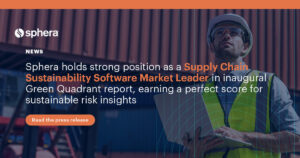The annual Conference of the Parties is taking place now in Baku, Azerbaijan, with the primary goal of addressing climate finance. The matter of financial support for developing countries continues to be a key topic given the growing costs of adapting to — and mitigating — climate change.
Progress toward climate action goals is also prominent on the agenda, and the conference kicked off with the hope that the parties will submit their progress reports during the summit. (They’re due by the end of the year.) These reports, referred to as Biennial Transparency Reports, are meant to provide updates on what individual countries have been able to achieve and how much further they need to go to meet their climate goals.
As it has been at COP29, the topic of transparency is always prominent in conversations on environmental impact, whether you’re talking about government action or business operations. Investors, consumers, employees and shareholders want clear and honest assessments of those impacts, and it’s these demands for transparency that are behind some of the regulations we’re preparing for today.
In fact, measurable, actionable and auditable climate-related reporting was very much in focus at our recent Sphera Summit in Frankfurt, Germany, with the implementation of the Corporate Sustainability Reporting Directive on the top of everyone’s mind. The inclusion of non-EU companies in this directive’s scope makes this a global concern.
In the U.S., thousands of businesses are preparing for this regulation. And companies that have operations in California are getting ready for its Climate Accountability Package. Elsewhere in the world, IFRS standards for climate-related reporting have been adopted by Canada, Australia, the U.K. and even the Hong Kong Stock Exchange.
Naturally, business leaders and chief sustainability officers are now wondering how the recent U.S. election results will impact climate-related reporting in the U.S. But with roughly 10,000 non-EU companies required to disclose their emissions under the CSRD and numerous states preparing to follow California’s lead in mandating corporate GHG emissions disclosures, significant reporting obligations will continue to exist for U.S. businesses.
However, climate disclosure requirements often complement the initiatives of sustainability leaders.
Pia Heidenmark Cook, the former chief sustainability officer at Ingka/IKEA and a keynote speaker at our summit, noted that sustainability and climate-related reporting rules have prompted companies to do things that they weren’t doing 20 years ago. That’s the positive side of climate-related regulations. But she pointed out that legislation takes time, and we need to be more agile in our approach to climate change. She encouraged us to be innovative and to “dare to fail.” Immediate action is needed, and we shouldn’t worry about making mistakes.
We were also fortunate to have Gary Foote, the chief information officer and executive ESG oversight at the Haas Formula 1 Team, with us at the summit. He echoed Pia’s comments about regulations, stating that they are “pretty powerful within the (racing) space.” He said racing teams that rely on complex supply chains need to be open about what they’re doing and where they are on their sustainability journeys, so stakeholders can hold them accountable.
Sustainability leaders like Pia and Gary are transparent about their organization’s environmental and climate impacts, and they don’t shy away from setting ambitious targets for reducing those impacts. They let their stakeholders know when they are making progress and how they’ll course-correct when they’re not. They hold themselves accountable, which generates trust.
Both Gary and Pia highlighted the role of stakeholders — suppliers, customers, employees and others — who help to hold organizations accountable. Stakeholder pressure isn’t going away any time soon. In fact, it’s likely to increase. That is our current reality, and it isn’t a bad thing. Throughout our history, certain groundbreaking businesses were able to see cultural changes taking shape, and they quickly responded to those changes for the benefit of all. The businesses that see and act on the cultural shift that is pressing for a healthier planet will deliver benefits for all of us. They also get to assume the position of first mover or fast follower within their industries, and those are enviable positions to be in.
At Sphera, we’re energized by these shifts. With our software, data and consulting services, we enable companies to measure, report and reduce their emissions; improve supply chain sustainability; and develop products that are more environmentally friendly. We are ready to support organizations that are poised for environmental leadership as well as those that have just embarked on their sustainability journeys. It’s very much a part of our mission to create a safer, more sustainable and productive world.
–Paul






